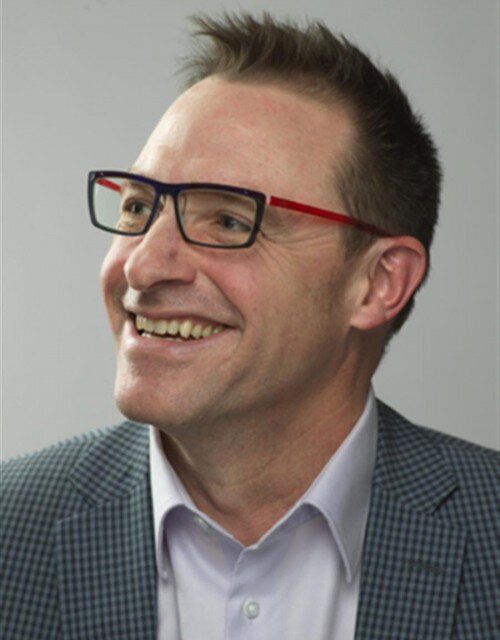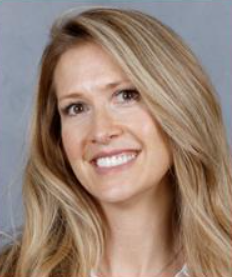New podcasts have been added to the Additional Resources section of the Competencies for Life website and we want to highlight the community leaders who have taken the time to share their stories. The Competencies for Life Podcast is a series that connects with working professionals in Calgary to talk about how they got to where they are today as well as reflect on how the competencies allowed them to be more adaptable in changing industries. Today we want to highlight our conversations with James McAra, Terry Rock and Sara Struthers.
James McAra is the President and CEO of the Calgary Food Bank. James grew up playing in sports and after high school he didn’t know what he wanted to do. After completing some work experience and getting involved in the community, he went to the University of Alberta where he enrolled in business. During the early stages of his business degree, he found that he was more interested in the Kinesiology side of Physical Education. So, he was able to blend his interests of economics, communications and marketing in his Business degree with the human anatomy and physiology courses of the Physical Education side. James was able to look at the skills he had fun with, knowing that at one point he would be able to use them to make a living. So, after university he got an opportunity to play hockey in the Arctic. This turned into an amazing opportunity to meet new people from Canada and all around the world. When he finished his contract in the Arctic he went back to university and wrote his masters on Traditional and Aboriginal Culture and Change where he looked at being able to share the voices of the people and community he connected with during his hockey contract. In 2000, James found himself back in Calgary accepting a Public Affairs Manager job. Then, in 2007 became the CEO of the Calgary Food Bank.
James’ journey from Sport and Rec, Kinesiology, business, hockey and Aboriginal studies are all what contributed to his role at the Food Bank and helped shape the work he does today. James says it all stems back to people. When you look at the basis of play in human society, the interaction of people and the concepts around play and sport are surrounded by how you are going to live in your community. He says, as we develop tools in recreational sport and play, there is curiosity around the idea of “what is happening to me”. James used curiosity as a tool to pull pieces together and it allowed him to reflect on what he learned from the stories people shared with him and therefore, opened conversations to also understand people more. He was able to see the opportunities available and develop relationships that are not only fruitful for himself but for the rest of his community. Listening to people’s journey’s and incorporating and honouring that understanding is a big part of what got James to where he is today and helped shape who he is.
James says that developing the competencies is about being a better person, a better citizen and building better communities because it’s not only personal but it’s emotional. Therefore, the competencies that spoke the most to James were Curiosity and Systems Thinking. James realized very young that he was a curious person, and he took that with him in every situation he was approached with. James also aligns with Systems Thinking in the world of the Food Bank. He uses an example that states, if you are exploring and you are down in the valley and you are trying to make your way through the mountain range but all you can see is trees and rocks, then at some point you have to get out of the valley and up high enough to see the different paths you can take. He says Systems Thinking will allow you to look at the bigger picture and all the forces that are in play. He uses the Food Bank in relation to this example and says that food is just one component. But when you back up and look on top of the hill, you can see that there are issues like accessibility, financial income, taxation, education and transportation. All of which fit into the bigger picture for the need of the Food Bank. Systems Thinking allows you to see all the interplay of these pieces and can be used to guide your path. James’ advice? There is a lot of wisdom and knowledge out there. It just may not be in the places that you think it’ll be. Be open to going into the shadows and always air on the side of compassion. Be proud of who you are and make sure whatever you are saying also matches what you do.
Another recent podcast uploaded on the Additional Resources section of the Competencies for Life website is with Terry Rock. Terry is the President and CEO of Platform Calgary. He graduated from the University of Saskatchewan with a Bachelor of Commerce (with Distinction) and after his undergrad he moved to Texas with the love of his life. Terry wasn’t able to work in Texas, but he was able to do a little bit of consulting and ended up applying to grad school where he took a PhD in management with a focus on Strategic Management, Entrepreneurship and Innovation. After completing his PhD, Terry found a job as an Assistant Professor in the Faculty of Management at the University of Calgary. He later found, much to his dismay, that he didn’t want to be a professor. So, he took a path that landed him in Venture Capitalism. Except in the late 90’s to early 2000’s there wasn’t a lot of venture capital investing anymore. He then turned to an opportunity back at the University of Calgary as a Civic Partnership Consultant where he wrote the Policy of Partnerships for the City of Calgary. He helped design the civic partnership approach and was assigned the arts portfolio from the city’s perspective. From that, he re-wrote the cities art policy and recommended that organizations be put in a place that allow them to strategically develop an art centre. He was then asked to set up what is now called the Calgary Arts Development Authority where he was President and CEO from 2005-2015. He then became the Executive Director of the Alberta Small Brewers Association due to a connection he made with a client in his previous role. This led him to his current role in becoming the President and CEO of Platform Calgary.
Terry talks about the need to be incredibly adaptable throughout his journey of switching from Academia to the Entrepreneurship sector. Adaptability has helped him not only in a personal way but within the many initiatives he has taken in business as well. He talks about how the first time he came out of university, he thought he had to have a career plan set. Terry talks about learning the importance of adaptability in university and the ability to try things to find what succeeds and what doesn’t and therefore, push on the things that are most successful and drop the things that aren’t. Although it may be hard personally and emotionally. Terry also speaks about the importance of having a strong support system around you in order to help you be adaptable. His advice for when you are experiencing lulls or how to get through tough times, is that you’ve got to have perspective. It’s easy to fall into an “all or nothing” way of thinking and it doesn’t have to be that way. He says that the transferable skills, or enabling competencies you have, can almost all be transferred into different contexts, if you understand what’s core to that skill. He found he was good at taking a big, high-level perspective, and translating that to people who are trying to get on the same path. He found he was able to do that anywhere, after he did the introspective work.
We asked Terry what competencies resonated with him the most and he said Collaboration. It comes down to a shared vision he said. When he enters a conversation with someone, he steps into it with an open mind. At Platform Calgary, their number one guiding principle is “collaboration first”. As Platform Calgary is trying to build an innovative ecosystem in Calgary, having a collaborative approach allows you to build on a shared vision and goal. Other competencies that resonated with Terry is Emotional Intelligence, Inspiring and Leading Others and Curiosity. His ability to ask the important questions and think beyond the current situation are all skills that are a part of his toolkit today. His advice for people who might be nervous to ask the hard questions is to have confidence. He says open ended questions are always welcome because they invite people to imagine and think. He says, if you can imagine the best dinner party you could go to, there is freedom to the conversation. People enjoy the invitation to have these conversations especially if you are generous and generative in your approach. He also says that with more experience, comes confidence. Part of confidence is having a clear understanding of “what’s the worst thing that could happen?” There’s not a lot of bad things that can happen when asking questions and being curious. You just have to practice it. From Terry’s previous experience, he gained confidence from being around people that valued him. He built a network that supported him and vice versa. He says not being afraid to step into those opportunities have helped him so much. The network you have outside of yourself is a huge asset. Being able to build, understand and contribute to that network is part of the whole story.
His advice? Be curious. Terry’s ability to be curious is what has driven him to all the different contexts and industries he’s worked in. He says that the times he hasn’t been curious are the times he’s stopped growing. It’s the mindset you have to either being a job taker or a job maker. He says, one of the most resilient things you can do in your life is to see your life through an entrepreneurial lens, which is crucial for the future of our city. We need more people to create things for there to be more opportunity of prosperity for others. Terry wants more people to realize that they have way more control over their life then they think they do. That no matter what your experience or path to date has been, there is no one like you that has those unique experiences and competencies. Know that there is something in the city for you to get on the path that you want. Whether it be skills for upgrading or starting your own business or being a part of a team that’s creating something.
Lastly, we had Sara Struthers on the podcast. Sara is the Manager of the Individual Learner Services Talent Hub at SAIT. Prior to her role at SAIT her professional background was in the recruitment field, helping companies find the right fit for talent. Previous to that, she was working with her family-owned business, Normont Industrial. Sara originally came to Calgary to set up offices for the Western Canada division of her company at the time. She was involved in sales, managing clients and selling the products that were originally manufactured in Montreal. Sara now finds her work at SAIT to be extremely rewarding. He role involves setting up a series of bootcamps to help career professionals transition their careers into the tech industry and boost the skills that they already have. Sara and her team provide support to these students with resume building, interview skills preparation and building their LinkedIn profile. They essentially act as a coach for these students throughout the 12-week program and even after they graduate, they continue to provide support and meet with them regularly until they find a job. She says it’s really rewarding to meet and help them find growth in a new career in tech and existing industries.
Sara says that in order to not be afraid of change, adaptability is really important for these mid-career people. People who struggle to adapt to these new technologies are the one’s struggling to find a new place in the workspace. She says you have to be curious, open minded and flexible in the way you are thinking. The secret sauce she says to being adaptable? Continuous Learning. Sara says looking for new skill sets and ways to adapt with emerging marketplaces will help you to be more creative in the ways you solve problems. The people who are the most successful are the ones who have strong adaptable enabling competencies. The advice she has to being more adaptable? Have an open mind and be aware that in some cases you might have to take a step back in order to step forward.
Sara has experience transitioning from something she never thought she would transition from and it can be scary, but you have to be open to the challenge. She says it’s how you react to the challenges that is going to make you successful. It’s about being Self-Reliant and open to learning new skills. Having Determination and believing in yourself will also help you move into new industries. Sara talks about the competencies, Problem Solving and Self-Reliance, being the most significant in her career and how they helped her throughout all the changes in her path. From starting a whole new division of her family-owned company in Calgary, there were a lot of unforeseen challenges and problems she had to overcome. It’s through this that she learned that you have to believe in yourself and problem solve in order to make it work. For her, it was about learning on the job, meeting new people, thinking outside the box and asking for advice. She say’s don’t be afraid to take a challenge. Those who are successful are the ones who accept challenges, adapt to the changes and don’t give up. Having things not work out the first time doesn’t make it a failure. Sometimes the first time might not work out, but it’ll be the third time that does. There is so much to be learned through mistakes that you can learn and grow from in order to become stronger. She says if she were to look back on her career, she would tell herself not to worry so much. You can’t control the unknown so don’t fixate on the “what if’s”, it all tends to work out in the end.
We have many more guests on the Competencies for Life podcast that you can find in the Additional Resources section on the Competencies for Life website. Listen to the stories of;
Sharon McIntyre, Consultant & Educator in Marketing, Entrepreneurship & Innovation from Mount Royal University and President & Founder of New Cottage Industries & Co.
Candice Goudie, Executive Director of the Calgary Flames Foundation and Community Investment.
Clayton Seams, Experienced videographer, editor, photographer, and writer with a focus on automotive media.
Cheryl Kinzel, Interim Dean of Research & Innovation at Bow Valley College.
Abdur Hussain, the grandfather, founder of Legends Basketball and the heart and soul of the organization.
Jennifer Konopaki, Executive Director, Sport at WinSport.
We hope you find inspiration in their stories and how the competencies helped shape their professional paths.










